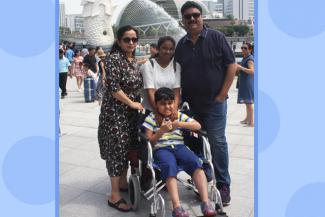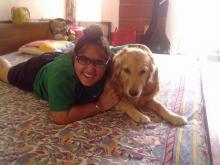
Hitesh Chowhan, 52 from Bengaluru, shares the challenges of bringing up his son Rishi diagnosed with Autism and Duchenne Muscular Dystrophy, a rare disease. The constant struggle to make him independent and as comfortable as possible. And of course a hope for a cure.
My son Rishi is nearly 10 years old and has both Duchenne Muscular Dystrophy (DMD) and Autism.
Early Symptoms and Diagnosis
He was diagnosed at the age of 5. We consulted doctors when we noticed that he was unable to lift himself up from the floor on his own.
This was the first time we had ever heard of such a condition called DMD. We have no history of DMD in our family. We were not aware that such a thing can happen to children. He was diagnosed as autistic two years earlier and we were just coming to terms with that. We had accepted his autistic condition and were working hard on his speech, occupational and other interventional therapies. The news of DMD felt like somebody had driven the last nail into our coffins.
Present condition
With regards to his DMD, he has a gene mutation due to deletion in his exon 46-48. This has led to progressive weakness and degeneration in his muscles. He is ambulant and can walk short distances. At home, which is a known territory, he walks around comfortably. He is also able to use the washroom on his own. He does need rest after a few steps. Climbing stairs is not possible anymore. His lung and heart functions are normal. He had foot drop in his right leg, so he got Tendon elongation procedure done at 8 years of age. His foot is now okay. However we feel that he might not be in this comfort zone for much longer.
Interaction with other children
With his Autism, which is a Pervasive Developmental Disorder he has poor motor skills and delayed speech., Speech has recently started but there is no language yet, a lot of prompting is required. He has a several sensory issues but they have subsided over time. Eye contact is now more or less solved. As he grows, his understanding level has increased. He is starting to relate to other children but gets frustrated as he is not able to run, walk and play like them.
Earlier being an autistic child, he was not aware of his condition and everything around him was irrelevant. He had assumed that the condition he was living in is normal. However, since the past 6 months, his understanding level has increased and he is able to understand that he is not like other kids. This has caused anxiety and behavioural changes. For instance, he goes down to play in the garden only when he sees that there are no other children playing in ground.
He cannot verbally communicate but by his actions we can understand that he is does not feel comfortable that other children see him or maybe he does not want to show his disability to other children.
Medications
At this time he is on a corticosteroid called Defcort- 18-24mg per day. As a side effect of the medicines, he has put on some weight, and of late he has reduced his food intake as we feel he has some discomfort in his stomach. He also has occasional mood swings, and gets pretty upset and violent at times.
Resources we work with to manage the condition
We see a Pediatric Neurologist once every 6 to 8 months. There are no specific resources as far as DMD is concern , However few of the parents like me and Anand have set up a centre to help kids with DMD, with in house research facility to find some sort of therapy to help these kids.
As far as Autism is concerned we have lots of Speech therapy centers, Occupational therapy centers, behavioral centers etc.
We have also found that Homeopathy is helping him with some Autism symptoms - to keep him calm and focused on what he is doing. (Editor's note - Often parents try out homeopathy for managing some symptoms. Some have seen some benefit or temporary benefit. If you try it out, please monitor carefully. There does not seem to be any evidence on how homeopathy helps)
Lifestyle Adaptations
We had to make lot of changes in our lifestyles.
Outings: We could not freely go out, we needed to study the place we had to go to and then decide if we could take him with us. If it was not possible then one of us stays at home with him and others go. All our planning is based on Rishi, his therapy class came first before any our plans. We needed to work around that. If there are any jobs or errands that require both my wife and I to go, we make sure we do it when he is in School.
In the beginning since he was not toilet trained, we needed to be careful while going to public places. Movies, plays, visiting relatives was cut down to bear minimum. We had to bring about changes in eating out, as he never enjoyed eating out. We had to incorporate in our lifestyles as he had significant sensory and other issues due to his being severely autistic in the beginning.
However many of his habits have changed after Speech Therapy and Occupational therapy. He started enjoying going out and started to relate to his surrounding. But his DMD caught up with him. When we travel or go on holidays, we need to be sure that we will find wheelchair friendly environment. It limits our options.
Society and Family Acceptance
We did not really face stigma from society, because from day one we were open to the society about his condition (this was possible only because we accepted him the way he is). Since we did not hide anything from society, society accepted us well. However strangers do look at him and wonder what maybe wrong, but that has not bothered us in any way.
During the initial years, even my elder daughter who was 10 at the time was reluctant and anxious to be around her brother. She would avoid being in any photographs with him and barely communicated with him. Time has changed her now. She is 16 and closest to him; he obeys her more than us and has slowly emerged as our pillar of strength in fight against DMD and Autism.
As parents, we are his sole supporters. We would like to have our extended family accept him and provide moral support.
School and Activities of Daily Living (ADL)
Rishi goes to a Montessori school which has turned out to be a boon or blessing for us all. He is 10 years old but he continues to go to the same school. The school was gradual with their progress and applied no pressure on Rishi or us with regards to his learning. Today he is able to recognize alphabets and numbers, and will soon be introduced to academics like reading and addition this year.
Toilet training was one of the self help skills the school has managed. Others like self-feeding, feeding himself with spoon, wearing his clothes. School has helped us in resolving many issues with him.
I do not think he has any friends, and we cannot expect Montessori going children to understand his condition and accept him as their friend.
A Rollercoaster Ride
Well what can I say, it has be a rollercoaster ride! First the news of Autism had devastated us. Questions like "why us" and "why him" rolled in our minds for quite some time. After the intervention therapies started, we saw no change in him for the first 6 to 10 months. This frustrated us even more and we felt like we were climbing Mount Everest! However after a year of therapies he developed eye contact which gave us some hope in what we were doing. We reconciled with the fact that this was going to be a very long journey and that we cannot be impatient. After accepting the terms, we started working much harder.
Then came the diagnosis of DMD. Like I said earlier, it was like the last nail in the coffin. However after consulting doctors we understood that this condition has no treatment in the world and his journey might end in late teens or early twenties. There was nothing we could do for his DMD and decided to play along and concentrate on dealing with his autism.
We would like to work towards making him self sufficient, train him to an extent that he can take care of himself and also do something meaningful in his life. We felt that we needed to empower him in such a way that he can lead a decent life without external support. And we have been successful in helping him manage his autistic behavior by teaching him lifeskills and empowering him so he can survive in the world.
Once we are able to help him become independent, we can then focus on how to best help him with his DMD. Best option is to keep him on regular physiotherapy and keep him walking as long as possible.
My advice to parents in similar situations:
Patience is the name of the game here! We as parents need to be comfortable handling them, this helps our children cooperate in whatever we want them to do. If we are impatient and show signs of despair, they will understand our condition and may not cooperate with us. So in short the caregiver should be calm and get therapies done according to moods and wishes of the child. We should not force them into doing any therapy in which the child is not comfortable.
A hope for a cure
Today with his very much improved status with regards to his autism, I wish I could get a magic wand and shoo away the DMD, so that my child can live a normal life.
My Son's Rare Disease Duchenne Muscular Dystrophy Has Made Us Stronger







